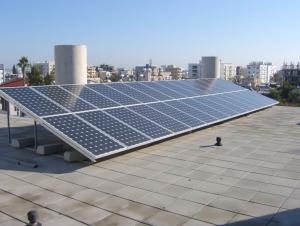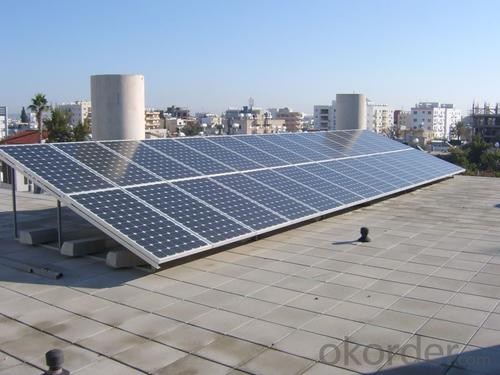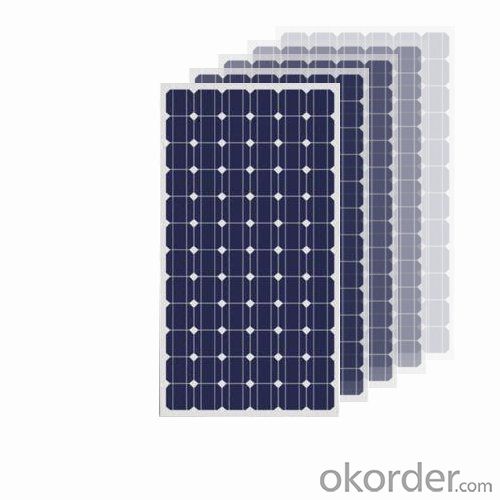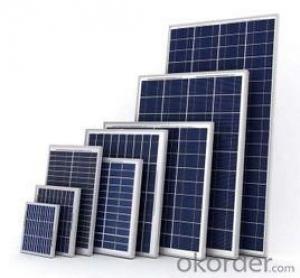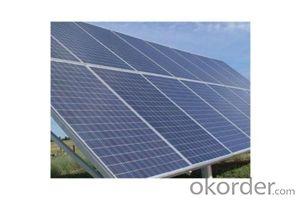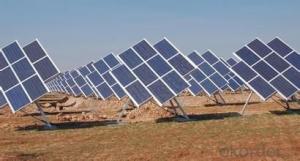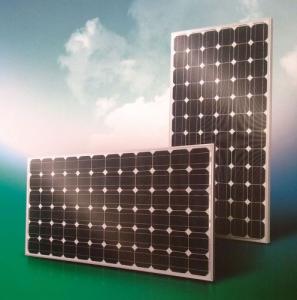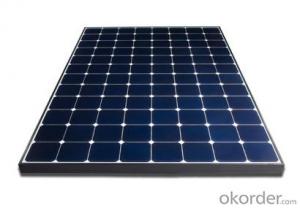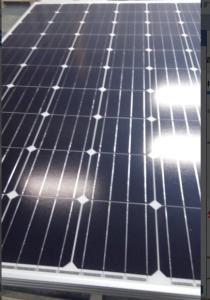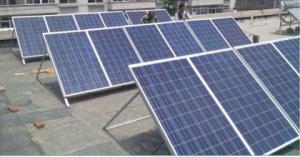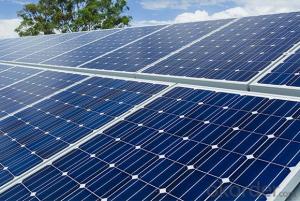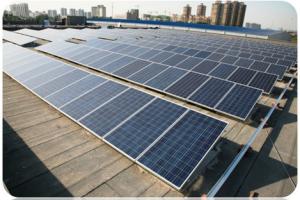Highest Rated CNBM 48-Cell Mono Crystalline Solar Module 220W
- Loading Port:
- China main port
- Payment Terms:
- TT or LC
- Min Order Qty:
- 100000 watt
- Supply Capability:
- 10000000 watt/month
OKorder Service Pledge
OKorder Financial Service
You Might Also Like
About us
CNBM International Corp, established in 2004, is the business entity for trade and logistic of CNBM Group.With the advantages in Cement, Composite Materials, New Building Materials and Engineering, CNBM mainly concentrate on coal, steel and construction equipments and give priority to solar and wind energy development.CNBM International is highly recognized by its business partners and clients all over the world and has established good business relationship with the customers in over 120 countries and regions all over the world.
Why LDK Solar Monocrystalline Modules?
Industry leading module power output warranty of 25 years
International quality and safety certifications
Manufactured in ISO 9000 certified factories
High-reliability with guaranteed 0/+5W peak power classification
Excellent performance under low light environments
Entire module certified to withstand high wind and snow loads
Warranty
LDK Solar provides one of the most comprehensive module warranties in the industry:
10 years for product defects in materials and workmanship
First 12 years for 90% of warranted minimum power
Remaining 25 years for 80% of warranted minimum power
Dimensions(Laminate):1320 x 986 x 35 mm [51.97 x 38.82 x 1.38 in]
Solar Cells:48 (6x8) monocrystalline silicon -
156 x 156 mm [6 inch] solar cells
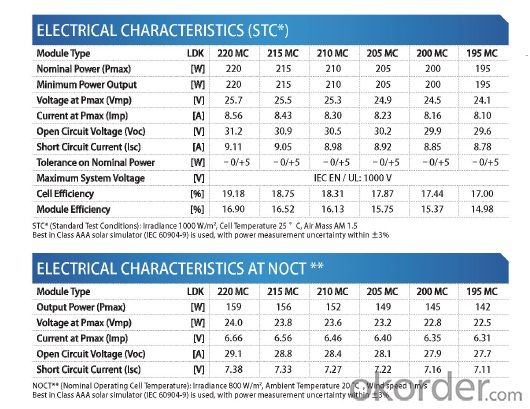
If to get more details, would please kindly review the datasheet as attached?Thanks.
- Q: How do solar panels perform in extreme temperatures?
- Solar panels can still generate electricity in extreme temperatures, but their efficiency may be slightly affected. In high temperatures, solar panels may experience a decrease in their power output due to increased resistance in the electrical circuits. In extremely cold temperatures, solar panels may become less efficient temporarily, but they can still produce electricity as long as there is sunlight. Overall, while extreme temperatures can have a minor impact on solar panel performance, they are designed to withstand a wide range of weather conditions and continue to produce clean energy.
- Q: K i'm almost ready to give up! I've bought every kind of pv I can think of, and I can see this technology will not be affordable in my lifetime.I conserve all I can (so far as to handwashing my laundry etc) I'm not rich, but I'm saving for a solar pv with decent amperage. I love tinkering with things if I see the point.All the cells i've seen are very weak. What PV would you buy? (all I need is to power my computer from a deep cycle 2 volt battery connected to an inverter)God Bless You
- If powering a PC is your only goal, consider replacing the power supply in your PC with one that runs off native 2 volts (like the kind intended for RV's). Then you can avoid the 30% loss of energy in a cheap inverter.
- Q: Do solar panels work in cloudy weather?
- Yes, solar panels do work in cloudy weather. While they may not produce as much electricity as they would on a sunny day, they can still generate power from diffused sunlight. Cloudy conditions can reduce the efficiency of solar panels, but they are still capable of converting light into electricity, making them a viable option for renewable energy even in less sunny areas.
- Q: I've been reading up on Solar panels because I think in the long run this would be beneficial in the long run. My Dad had looked into it before passing and had said it was too expensive. How much does it range for getting them placed on the roof and how exactly does that work? I think I remember being told that PGE has incentives and could possibly even end up paying you for having it? What does having panels cover? I know electricity but does it also heat things up? Sorry I'm kinda dee dee dee on this lol. Any and all information would be greatly appreciated. If anyone has solar panels can I get your experiences with them? Thanks!!
- The solar panels that we all simply would think are the greatest thing ever are very, very expensive and require strip mining of huge areas of land to make. For several million dollars you can buy what usually is mounted as power source for space satellites upon your roof. This 2'x2' panel and a barrage of battery storage takes care of all the electrical needs you could ever have at home. But this profoundly environmentally destructive technology is not what you had in mind, I'm sure, but is what has been around for quite some time now. It's been a challenge to make solar panels without using complex chains of excited rare metallurgies, but we seem to be getting better and better at it--but I trust others should help you with the practical, now that you know the best panels are not best for us at home.
- Q: Hi, I am very interested in solar panels and would like to know more.Can someone please give me a basic explanation of how solar panels work?Thank you
- A solar panel is made up of many small solar cells. Each solar cell uses light to make electricity. The solar cell uses light to make electrons move. The cell is made up of two different layers that are stuck together. The first layer is loaded with electrons, so the electrons are ready to jump from this layer to the second layer. That second layer has some electrons taken away. It is ready to take in more electrons. When the light hits an electron in the first layer, the electron jumps to the second layer. That electron makes another electron move, which makes another electron move, and so on. So the light started a flow of electrons, or electricity.
- Q: Polycrystalline solar panels are good or single crystal solar energy is good
- Polycrystalline silicon solar cell production process and monocrystalline silicon solar cell almost, but the polysilicon solar cell photoelectric conversion efficiency will have to reduce a lot of its photoelectric conversion efficiency of about 12% (
- Q: What is the lifespan of solar panel batteries?
- The lifespan of solar panel batteries can vary depending on various factors such as their quality, usage patterns, and maintenance. On average, well-maintained solar panel batteries can last anywhere between 5 to 15 years. However, advancements in technology and improvements in battery design are constantly being made, which could potentially extend their lifespan in the future.
- Q: Can solar panels be installed on a warehouse or industrial facility?
- Yes, solar panels can be installed on a warehouse or industrial facility. In fact, these types of large commercial buildings often have spacious rooftops that are ideal for hosting solar panels. Installing solar panels on warehouses and industrial facilities can help reduce electricity costs, generate clean energy, and contribute to sustainability efforts.
- Q: How do solar panels affect the roof's structural integrity?
- Solar panels do not significantly affect the roof's structural integrity. They are typically lightweight, and their installation involves mounting them securely onto the roof without causing any damage or weakening.
- Q: I am learning all about heat radiation in Physics. There is a question I am doing about Solar panels. It asks, why do glass covers improve the efficient of solar panels? I dont really understand. How do they?? thanks :D x
- Clear glass will allow most of the electromagnetic energy of sunlight into the air-tight volume of the solar panel. The light strikes the black coated metal tubes and the black coated backing, and is absorbed as heat. Part of this heat will radiate as infrared radiation, and much of this will leave through the glass. But a great deal of it will initially remain in the metal as heat. This heat will be partially transferred to the surrounding air, but because the glass stops the mixing of this air with the rest of the atmosphere, this heat will stay mostly contained within the solar panel. If the glass were not there, there would be a huge loss of heat into the surrounding air.
Send your message to us
Highest Rated CNBM 48-Cell Mono Crystalline Solar Module 220W
- Loading Port:
- China main port
- Payment Terms:
- TT or LC
- Min Order Qty:
- 100000 watt
- Supply Capability:
- 10000000 watt/month
OKorder Service Pledge
OKorder Financial Service
Similar products
Hot products
Hot Searches
Related keywords
